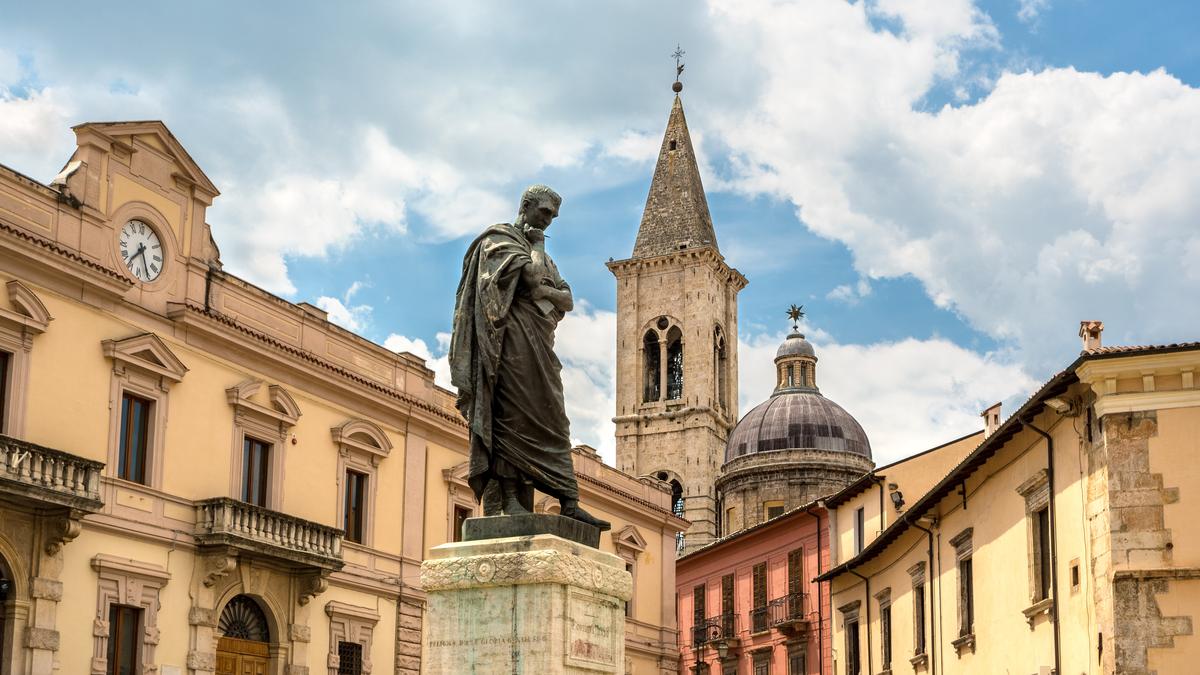
Reading Ovid and his ideas of empire from the subcontinent Premium
The Hindu
Jean-Paul Laurens' painting of Honorius Flavius captures the fragility of power in the Roman Empire's decline.
Nothing intimates the slow unravelling of the Roman empire quite like Jean-Paul Laurens’ portrait of Honorius Flavius — the boy emperor consumed by a world too big for him. Titled ‘The Late Empire: Honorius’ (1880), the painting captures the throne’s fragility and the boy who barely fills it. His face is young, untouched by experience, but his eyes already hold the heavy certainty of impending ruin. The feet swaying above the marble are as unsteady as his hold on power. The sword in his hand is more a prop than a weapon, and no amount of silk or gold can camouflage the looming collapse. Laurens wasn’t just painting the past. He was warning his own time. No empire, he seemed to say, is too big to fall.
A century before Laurens, across the Channel, Edward Gibbon had already chronicled the fall of Rome in The History of the Decline and Fall of the Roman Empire (1776–1788), attributing its demise to moral decay and barbarian invasions. He mourned the slow unravelling of an empire that had deemed itself eternal. Laurens merely painted what was already written. Both artist and historian engaged with Greco-Roman antiquity not merely as a subject of study but as a legacy crucial to Europe’s preoccupation with its racial genealogy. However, even as they traced their lineage to its grandeur, they cast its decline as a warning to their own time. They aimed not merely to inherit Rome’s legacy but also to reshape history itself, declaring in the process, the tenacity of their empire.
The Rome they evoke is one of poets and emperors, a city that witnessed the genius of Virgil, Horace, and Ovid — a Rome shaped by Augustus Caesar. If Honorius marked the empire’s decline, Augustus announced its ascent. As Rome’s first emperor, he forged an empire from the remnants of a republic. It is a rule invoked in Virgil’s Aeneid and consecrated by it. Virgil’s grand epic attested that even the most formidable sovereigns required literature to secure their power. In contrast, Ovid’s Metamorphoses emerged as the anti-epic, dismantling, as it did, the logic of empire. What Virgil built, Ovid ‘unbuilt’.
Years ago, Ovid entered the early English Honours syllabus at Delhi University. His was an ancient voice among young undergraduate minds, and despite all odds, it left them quietly transformed. He spoke to them in a language of power and authority, and of the uneasy ties both held with the act of writing.
Born on March 20, 43 BC into an aristocratic family, Ovid came of age during Rome’s political upheavals but found his footing in the stability of Augustus’ reign. Shunning a public career, he devoted himself to writing poetry that undermined with the empire’s moral imperatives. His Amores disregarded the call for patriotic verse. At the same time, the irreverent Ars Amatoria diluted the Augustan vision of marriage as a civic duty. By 8 CE, Augustus, dismayed by his granddaughter Julia Minor’s sexual misadventures, denounced Ovid’s work as a subversive influence. Condemned for immorality and a second, more elusive charge, possibly political, he was banished by the Emperor to Tomis. The term tyrant is frequently invoked, but in Augustus’ case, it may not have been entirely unwarranted.
In this light, Ovid’s Metamorphoses is more than a narrative of myths; it is a reckoning with power, a meditation on change. Of the proud and the meek. Of the rise of the reviled and the fall of the mighty. The gods, indifferent and cruel, play with human fate. Jupiter, the king of the gods, is both incredible and deplorable. Moral order gives way, not to chaos, but into a world unsettled by enduring transformation. The revolutionary morality of Metamorphoses underscored the futility of rulers — Augustus chief among them — pursuing absolute power. To read Ovid is to engage with volatility. He demonstrated how empires validated themselves and how they inevitably faltered. Ovid, we realise, was a victim of censorship, but he wasn’t a perfect victim. He spent his days in Tomis pleading for imperial favour. His pleas went unanswered. Nevertheless, Ovid’s work offers an enduring lesson.
In 2018, Andrew Anglin, founder of the neo-Nazi (anti-immigration, and Islamophobic) website The Daily Stormer, invoked Augustus to laud Trump’s immigration policies, arguing that ICE should be refashioned into the American President’s Praetorian Guard. The last few weeks have taught us that this is less improbable than it sounds. Morality, sexuality, and immigration haunt the minds of leaders who dread being questioned. The alt-right and neo-Nazi movements have resurrected the classical past and distorted it, shaping it into a myth that upholds illusions of Western supremacy. To read Ovid from the Global South is to summon a counter-narrative; one that pries Greco-Roman antiquity from the hold of Western exceptionalism and restores it to a shared, contested part of human history.

 Run 3 Space | Play Space Running Game
Run 3 Space | Play Space Running Game Traffic Jam 3D | Online Racing Game
Traffic Jam 3D | Online Racing Game Duck Hunt | Play Old Classic Game
Duck Hunt | Play Old Classic Game











